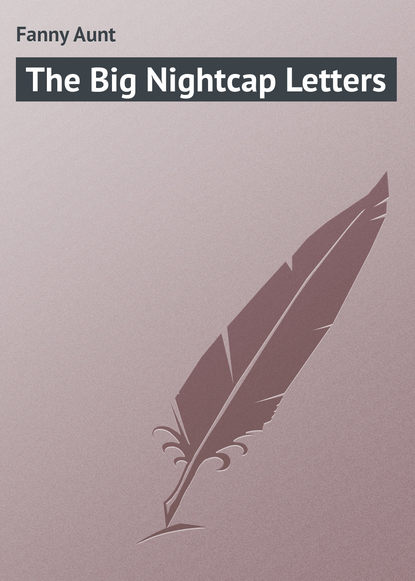По всем вопросам обращайтесь на: info@litportal.ru
(©) 2003-2024.
✖
The Big Nightcap Letters
Настройки чтения
Размер шрифта
Высота строк
Поля
"'What on earth do you mean?' cried the captain, as he and the rest burst into a laugh.
"Harry explained how Jack Bowsprit used to beat him with a rope's end, which he called his wife, Susan, and how he hated Susan worse than poison.
"They all laughed again at this, and the captain promised that Susan should be thrown overboard as far as he was concerned, and that he should be taken safely home.
"So Harry went with the officers, who treated him as if he was their son; and after a prosperous voyage, he arrived safely at New York; and money was given him to get home.
"That very evening Harry stood once more before his sorrowing, almost broken-hearted parents. What did they do? They did not utter one word of reproach; they just opened their arms, and the boy flung himself upon their breasts; and amid tears and blessings all was forgiven. But not forgotten. Oh, no! for Harry, once so heedless, tried his utmost to correct his faults, and with God's help, he succeeded; and now he is so steady, industrious, and obedient, that it is almost impossible to believe that he ever was called
HEEDLESS HARRY."
There was many a roguish, laughing look cast at Harry as this strange story was being read; and when it was finished, George exclaimed, eagerly – "Oh, mamma! what a pity Aunt Fanny did not know about Harry, and the old black cook, and the dishcloth! Wouldn't she have laughed?"
"Tell us about it, Harry, do! do!" cried all the brothers and sisters.
The children knew the story as well as Harry, but they delighted to watch the sparkle of his eyes, and his animated gestures, for to tell the truth, he did enjoy mischief beyond words to describe.
"Well," cried Harry, jumping up, "you see I would go down in the kitchen and teaze the cook; and she could never touch me with the broomstick, because I ran full tilt; and she was very fat, you know, always trod on her dress, and sometimes came down flat on her nose.
"Well, one day she said – 'If you come in the kitchen again, I'll pin the dishcloth fast to your jacket!' I came right back. 'Pin it!' said I, 'that's all I want.' So she pinned it, and I stood very, very still till it was done. Then I made one jump in the air, and gave one tremendous shout, and put square up stairs for mother's room, the cook after me; but I ran fastest, she was so fat. I got in the room first, tore off the dishcloth – her best dishcloth – bran new, and threw it into the very middle of the fire; and she had the pleasure of seeing the last of her new dishcloth blazing up the chimney. So that's what a cook gets when she pins her dishcloth on a boy."
The children clapped their hands, and screamed with laughter at this story; and they laughed still harder, when Harry put on a comical, half-provoked look, and added, "But you know mother made me take the very money I was going to buy a new ball with, and buy a yard of crash to make another dishcloth for the cook; that crashed me, so I don't think I shall burn any more for the present."
And now the children, bidding each other "good night," went skipping and dancing to bed, delighted with the evening's entertainment, wondering who would have the next story from Aunt Fanny.
THE THIRD LETTER.
POOR RICH LITTLE EVA
For Anna
Dear Anna: – I have lately been reading a book full of pure and beautiful thoughts, called "Vernon Grove," and the other evening I became acquainted with the authoress. She is a most lovely lady, dignified and graceful; and I had a very delightful conversation with her about books.
In Vernon Grove there is a short story about a dear little girl, which story interested me so much, that I asked permission of the authoress to copy it out for you. Here it is, somewhat enlarged and altered, but the main parts just as she wrote it. I know, dear Anna, it is exactly such a tender, sweet story, as will most gratify your affectionate heart; so it is yours, with a kiss from your loving
Aunt Fanny.
"POOR RICH LITTLE EVA
"On a curtained bed, in a darkened chamber in the city of Charleston, not many years ago, lay a beautiful lady, pale – almost dying; but, oh! how happy, for her earnest prayer had been answered, and God had at last given her the blessing of a child, and the little tender life was even now nestling soft as a rose-leaf in her bosom.
"It was late in the sweet spring-time, which in that southern country is so beautiful. A hushed and joyous stillness reigned in the house, but every lip was smiling, from the good old black cook, who was 'so grad missis ben got her heart's desire,' to the funny little fellow with his wool standing up in kinks all over his head, who ran of errands, and who evinced his delight by walking on his kinky head all about the yard.
"Never was baby more welcomed. A daughter, too, just what her parents desired – a darling girl to be a companion for her mother all day long.
"The nursery was now the most interesting and delightful room in the house. Though evidences of boundless wealth and exquisite taste were in every part, until the baby came, it was only a grand, silent, gloomy mansion; for no young pure voice had awakened the echoes in the stately halls – no little pattering feet made there delicious heart-music.
"But now what a magic change! How friends flocked to see the wonderful nursery which the expectant mother had been so happy in preparing; how they peeped into the bureau drawers, and admired the piles of rare lace and snowy lawn, which were to enfold the delicate limbs of this favored child.
"And then the surprising and splendid toys in gold and silver! the beautiful pictures already hung upon the walls, painted by skilful artists, telling stories that she would understand almost from infancy, of 'Little Red Riding Hood,' 'The Lamented Babes in the Wood,' and 'Little Mary and her pretty pet Lamb, who would go to school with her.' Ah! what a beautiful world was to be opened to the sight and mind of that sweet spring flower.
"Every day the good doctor came to see the mother and the little baby, and every day the mother grew stronger; and the greatest delight of both parents was to look at their new child, and softly kiss its tender cheek, and feel the velvet touch of its precious little hands.
"Then, very soon, it grew so knowing, and showed such surprising quickness, far beyond (the parents thought) of any baby ever seen or read of since the beginning of the world. Of course it was very red at first, but then the red was such a beautiful shade. It hadn't the least speck of hair; but what of that? There was a lovely expression about even the back of its head; really quite intellectual.
"Very soon, it would start at an unexpected noise or touch, and if dinner did not come at the very moment it was wanted, little Eva (for that was her sweet name) could cry in a manner to astonish you; but then, such an excellent cry! so loud and strong, that it was certain she had splendid lungs. And what more could a mother's heart desire? And her precious treasure was watched and guarded night and day by a mother's love, stronger than death.
"But what is this? The good doctor watches little Eva as she grows, and always when he looks at her, a sad, strange expression comes over his face; and one day, when going down stairs, he paused, and turned to go back, but did not, for he said aloud to himself: 'Not yet; they cannot bear it yet; and perhaps, after all, I may be in the wrong.'
"They were both so happy – that young father and mother! How they pitied all the poor married people who had no children!
"But the next day after this the good doctor decided not to withhold the communication, whatever it might be, from Eva's father and mother. As soon as he entered the room, he said abruptly: 'Nurse, bring me the child.' He stood by a window, and threw wide open the darkened blinds. The little Eva was brought to him just from her morning toilette, fresh, sweet, and pure as a rain-brightened flower; her long embroidered dress sweeping the carpet, and soft lace nestling about her tiny arms.
"'Oh, dear doctor!' exclaimed the young mother, 'do not take the baby there! That bright glare of light has dazzled even my strong eyes; and how can her feeble sight endure it?'
"'It is necessary, madam,' replied the doctor. He seemed to be a cross old fellow, but beneath his gruff manner was hidden a great, kind heart.
"He took the child, and having sent the nurse away, turned from the mother, who lay anxiously watching him. He gazed fixedly at little Eva, while he exposed her beautiful and tender eyes to the bright glare of the morning sun. His brow was contracted into a great heavy frown, and a short but deep sigh escaped him; but he never took his eyes from her face: then he forced the lids, with their long silken fringes, far away from the ball of the eye, and little Eva was now screaming with the pain caused by this rough and cruel treatment. Alas! a deeper shade of anxiety crossed the doctor's face, and the hard and unfeeling man, as the weeping mother thought him, drew the infant tenderly to his breast, and murmured in a low tone, 'Poor little thing! poor little helpless thing!' and gave her back to her nurse, and went away without saying another word.
"That same evening the doctor came again. It was very unusual for him to come after dark, and his great creaking boots and rough manner would have broken in upon a very pretty group.
"But he went softly up stairs, and looked in the room, unseen himself. There was the happy mother wrapped in a cashmere, and half-buried in an immense arm-chair, with a sweet motherly look upon her face, watching her darling.
"Close to his wife, Eva's father sat, holding her in his arms; and, wonderful to tell, for a man, holding her quite comfortably; for he had lulled her to sleep with a lullaby of his own composition, the language of which was utterly unknown to the rest of the company. He was learning to talk 'baby talk,' and was really getting on very well, and just now he was looking extremely proud and happy at his success in soothing the little one.
"Opposite to these happy parents sat Mr. Vernon, a noble-looking gentleman, and his wife, a beautiful lady, uncle and aunt to the baby; and, in the distance, was the faithful black nurse, old Dinah, fast asleep, and quite as happy, in her own opinion, as the rest of the party.
"Presently the father laid the baby tenderly down in her beautiful cradle, and while gently rocking her, said softly: 'I wonder what the baby was thinking about while I sang to her?'
"'She looked so wonderfully wise,' said the mother.
"'Did you ever come across that lovely little poem – "What is the little one thinking about?"' said Mr. Vernon. 'I can only remember the last part of it, though my little daughter has often read it to me,' and he recited, in a sweet, low voice, this exquisite little fragment:
"What is the little one thinking about?
What does she think of her mother's eyes?
What does she think of her mother's hair?
What, of the cradle roof that flies
Forward and backward through the air?
What does she think of her mother's breast,
Round and beautiful, smooth and white,
Seeking it ever with fresh delight —
Cup of her life, and couch of her rest?
What does she think, when her quick embrace
Presses her hand, and buries her face
Deep, where the heart-throbs sink and swell
With a tender love she can never tell,
Though she murmurs the words
Of all the birds,











